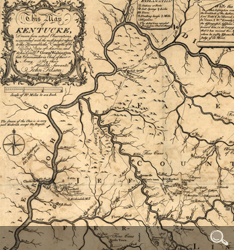

“It gives me pleasure to hear that there is such an accordance of sentiments between the Eastern & Western parts of this State.—My opinion of the seperation has always been to meet them half way, upon fair & just grounds & part like friends disposed to acts of brotherly kindness thereafter.” —excerpt from Washington letter
Support for Kentucky
When the Treaty of Paris ended the Revolutionary War in 1783, it gave the new United States the potential of becoming a vast empire. Washington saw that the western territories reaching to the Mississippi River offered the new nation a chance to expand, prosper, and become a significant power in the world. Yet the extent of the territory also created obstacles to unity. European settlers there might choose to separate from the eastern states, and Spain or England might undermine U.S. control in western territories.
Washington encouraged amicable and equal relationships between established states and new ones. Here, he wrote about settlers west of the Allegheny Mountains, who had petitioned the Virginia government for separation. Washington supported the separation, even though it meant a loss in population and power for his own state, because he thought it would encourage a stronger union. With the consent of the Virginia legislature, the western counties became the new state of Kentucky in 1792.
